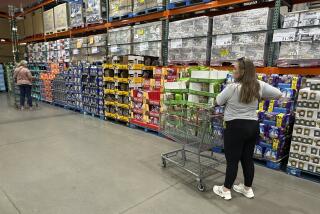Personal Income Rises Moderate 0.4% in July
- Share via
WASHINGTON — Americans’ personal income rose a moderate 0.4% in July as a big jump in Social Security benefits bolstered a meager increase in wages and salaries, the government reported Monday.
The Commerce Department said consumer spending also advanced 0.4% in July, but many private economists predicted that Americans will probably begin to spend less because of the slowdown in income growth.
About 60% of the increase came from a rise in government payments to individuals. The bulk of this was a $5-billion growth in retroactive Social Security payments that resulted from a recalculation of benefits for people who are still working while drawing payments.
In contrast, wages and salaries, the key factor in the economic decisions made by the average family, grew by the smallest amount this year, a slight $1.7 billion, far below the $10.8-billion gain in June. Analysts expressed concern about the lopsided nature of the income gain.
‘Pretty Lackluster Situation’
“Because of the importance of wages in supporting consumer spending, this suggests a pretty lackluster situation,” said Sandra Shaber of Chase Econometrics, a private forecasting firm. “Income growth has slowed very sharply.”
She said the weakness was likely to mean that the overall economy will expand an anemic 2% for the whole year. “We still think we can avoid a recession, but the risks are now higher,” she said. “When overall growth is that slow, it is very easy for the economy to slip into a downward spiral.”
The news on income growth was the latest in a string of weak economic statistics for July. Unemployment remained stagnant for the sixth straight month, retail sales and industrial production showed disappointing gains and housing construction fell last month.
“All these things point to an economy that remains in a very sluggish growth path with no significant rebound in process,” said Allen Sinai, chief economist for Shearson Lehman Bros.
The statistics were disappointing to the Reagan Administration, which is predicting that growth will rebound to a 5% annual rate in the final six months of this year, up sharply from the 1% turned in from January through June. But if the rebound occurs, it probably won’t be led by the consumer, who has given a variety of signs that the buying spree that has spurred the recovery so far is tapering off.
Robert Ortner, chief economist for the Commerce Department, said the modest wage increase in July suggested that growth in consumer spending won’t come “anywhere near” the 5.2% pace of the first half of the year.
The 0.4% gain in personal incomes for July matched the revised June increase, which had followed a 0.7% decline in May.
Disposable Income Up 0.4%
Disposable, or after-tax, income rose 0.4% in July, and analysts said this figure reflected a return to normal patterns.
Personal consumption spending, which includes nearly everything except interest payments on debt, rose $10.3 billion in July, with the 0.4% increase matching the June advance. A spurt last month in sales of durable goods offset a decline in spending on services, which includes such costs as housing.
The report said Americans’ personal savings rate--savings as a percentage of disposable income--was 3.4% in July. While this reflected no change from the June level, it still left savings at a historically low plateau.
More to Read
Inside the business of entertainment
The Wide Shot brings you news, analysis and insights on everything from streaming wars to production — and what it all means for the future.
You may occasionally receive promotional content from the Los Angeles Times.










